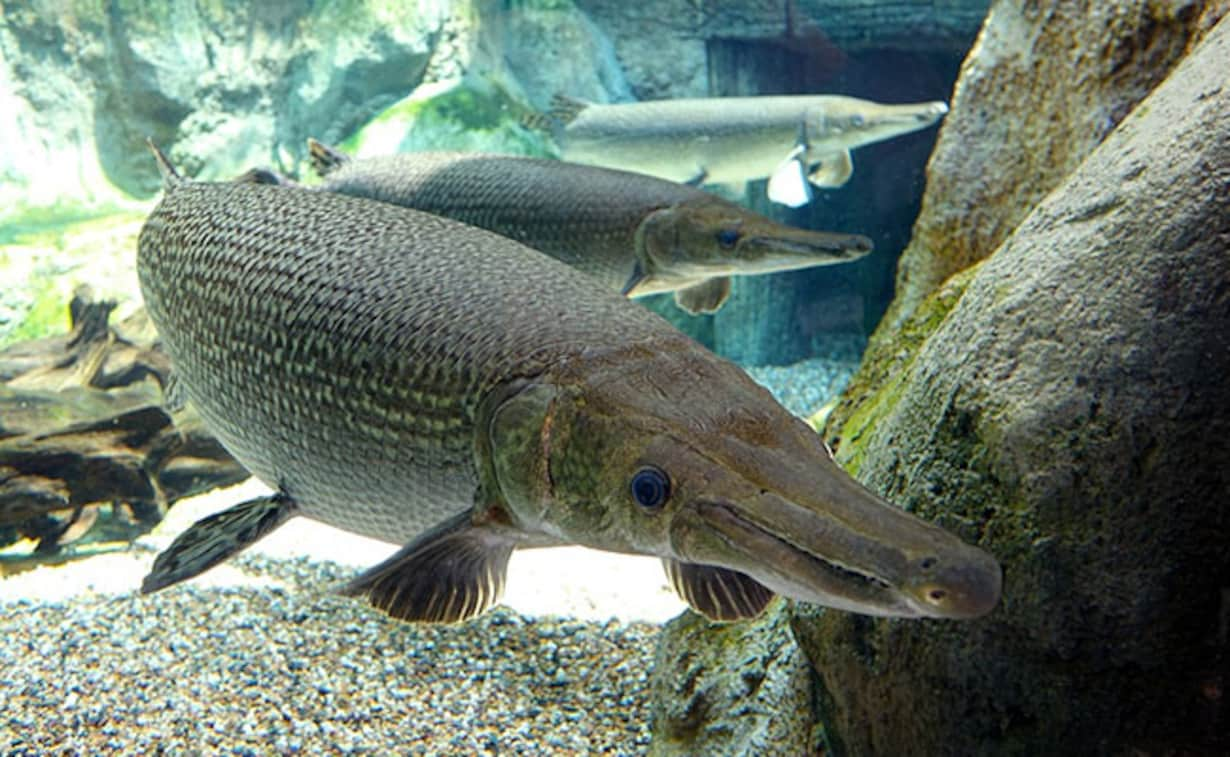
Alarm bells ring as exotic Alligator Gar Fish found in Dal Lake
Capturing of a fish resembling the Alligator gar fish in the Dal lake here has sent alarm bells ringing among the scientists who fear that the presence of non-native fish species could spell doom on the eco-fragile flora and fauna of the water body.
The Lake Conservation and Management Authority (LCMA) captured the alligator-shaped fish during the deweeding of Dal Lake near Sher-e-Kashmir International Convention Centre (SKICC) on May 12. The video of the unique fish went viral taking people as well as scientists by surprise.
Talking to KIF, Executive Engineer LCMA, Masood Ahmad Khan, who heads its Research and Monitoring Wing, said, “We were also surprised on seeing the alligator-shaped fish on the conveyor of the harvester near SKICC. This kind of fish has never been spotted in Dal Lake earlier. It looks like an Alligator gar fish. We have taken up the matter with the Fisheries Department and the Fisheries Division of the Sher-e-Kashmir University of Agricultural Sciences and Technology, Kashmir (SKUAST-K) and the Zoology Department of the University of Kashmir (KU) to conduct comprehensive studies to ascertain if there is presence of more exotic fish species in the Dal Lake.”
He said that one more alligator shaped fish of a smaller size was caught in Dal Lake near Habak on Sunday. The spot is around 5 km from the area where the first Alligator gar was captured. “This is a serious concern now. If there are more Alligator gar fish in Dal Lake, we have to ascertain its effects on other species in the water body,” Khan said.
The bowfin-related Alligator gar is a ray-finned Euryhaline fish and is one of the biggest freshwater fish in North America and the largest species in the “gar” family. Experts said that gars were frequently referred to as living fossils because they still exhibit some of their early progenitors’ anatomical traits.
Torpedo shaped Alligator gar fish have enormous snouts and long, pointed teeth. Dean Fisheries Farooz Bhat said, “We have collected samples and it looks like Alligator gar fish. This fish species is not native. The concern is that Alligator gar fish being carnivorous devours on other fish species. It grows rapidly and has a long life. Its presence can be very harmful for the ecology of the Dal Lake.”
He said that in the past many exotic fish species like Grass Carp have been discovered in water bodies in Kashmir. “But it is the first time that Alligator gar has been found in J&K. Alligator gar emerged in similar circumstances from water bodies in Bihar, Madhya Pradesh and Kerala. We will be conducting scientific studies to ascertain the emergence of Alligator gar fish in the Dal Lake,” Bhat said.
Former Dean Fisheries SKUAST-K M H Balkhi expressed concern over the discovery of Alligator gar in Dal Lake. “Capturing of this fish species from Dal Lake is surprising. It could be accidental or careless introduction, which may in the long run disturb ecology and available fishery in the lake because of feeding habits of Alligator gar. This needs detailed investigation by researchers,” he said.
Balkhi said that the recovery of this fish as well as other exotics in the recent past from the Dal Lake needed to be enquired by relevant scientists to curb this menace of unknown ambiguous introductions in Kashmir waters in an unscientific manner.
“SKUAST-K collected a freshwater gar scientifically known as Xenentodon cancila from Jammu waters under a research project a decade ago. The recovery of Dal specimens of gar could be a worrying sign for Kashmir waters and is not welcome. Such introductions warrant scientific studies keeping in mind the fragile aquatic ecosystems of Kashmir,” he said. HoD Fish Genetics and Bio-Technology SKUAST-K Irfan Khan told KIF that the Alligator gar was one of the top predators in its natural freshwater environment.
“There is a need to study how the Alligator gar reaches Dal Lake. It needs to be ascertained whether it was placed in the lake deliberately or accidentally and by whom,” he said. Khan, who has done extensive research on fish, said the Alligator gar feeds on larval fishes and insects.
“Adults will eat whatever they can catch, consuming primarily fish, but occasionally taking birds, mammals, and other animals. Alligator gar can ambush a predator and then attack with its large jaws. The gar’s good vision and ability to sense chemicals seem to be the main means by which they detect prey in the water. Alligator gars have about 80 teeth in total. Their teeth get replaced by new ones as they wear down. On an average, an Alligator gar goes through 2000 to 3000 teeth in a lifetime. They use their fang-like teeth to pierce and hold prey,” he said.
Experts say that the Alligator gar could live for many decades. These are monsters of fresh waters. They grow very fast when young, but growth slows with age. Alligator gar has been established worldwide as an outcome of the ornamental fish trade. This highly predatory species has been reported recently from several water bodies of different states like Assam, West Bengal, Odisha, Andhra Pradesh, Kerala, and Maharashtra, displaying its probable congenial interaction with the varied environmental habitats.
Khan said that aquarium hobbyists deliberately release the Alligator gar into the rivers, a routine method to get rid of the pet when it attains a large size. “Other than willful release by the hobbyist, extreme climatic events have often been identified for entry of the exotic fishes into Indian inland open waters as a route of entry of alien fishes into the natural ecosystem,” he said.
Noted environmentalist M R D Kundangar cautioned that Alligator gar fish species would prove disastrous for the Dal Lake as it is carnivore and would kill all fingerlings in fish species already present in the water body.
“It will destroy other animal fauna of the lake and will be dangerous for the swimmers. Alligator gar has already become a nuisance in Telangana and Andhra Pradesh and reports of the fish breeding fast and becoming invasive in water bodies of Tamil Nadu are also pouring in,” he said. “The government needs to investigate as to who are the people who are rearing such species in their aquaria. It is surely a deliberate release from one of the aquariums.”

